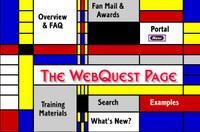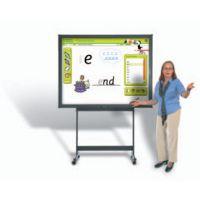Overcoming Obstacles to Quicker WebQuest Creation
What stops the adoption of WebQuests and other constructivist lesson formats? At a recent conference,
Bernie Dodge (the creator of the WebQuest model) analysed the problem and pointed to solutions that close the gaps.

There is an increasing interest in the use of
WebQuests in the UK, and I’m hearing more and more people asking about ways that they can be used to support their teaching and learning. They can make a really useful online resource however, as someone who has (a) created WebQuests, and (b) delivered training in how to produce them, I appreciate that while they can make a great teaching aid, then can also be very time consuming to create.
Fortunately this is something that others have also found and this has led to a closer look at ways that the creation of WebQuests can be simplified and speeded up. It was also the key theme of a presentation that Bernie Dodge gave yesterday, at the
NECC conference. (At which he also unveiled his new authoring environment that will be generally available on September 1).
The themes of this presentation are universal ones affecting most people that create WebQuests; they don’t appear to be unique to any specific authoring tool. This makes Bernie’s presentation particularly useful to anyone who wants to get an overview of what some of the main obstacles to WebQuest creation are, and how these might be overcome.
You can download the presentation (53 slides)
here.
Note – ACLearn tends to be the driving force for the adoption of WebQuests in Adult and Community Learning in the UK. They have a really
comprehensive website with links, examples and resources and
free software to get you started. If you haven’t yet seen the site but are interested in learning more about webquest adoption here, that’s a very good place to start!
Use of Interactive Whiteboards

Wow. If you are looking for information on Interactive Whiteboards this is a very good place to start.
Joop van Schie in the Netherlands has put together this
list of over 35 sites about Interactive Whiteboards. The list of sites includes ones with “evidence of the use of interactive whiteboards in classroom, lesson plans, tips on how to use them in learning and/or teaching situations, an overview of software that works well on a whiteboard, white papers from suppliers and more..."
As first listings go, this is definitely a useful one!
And in return, if you have anything to add to the list, I’m sure Joop would be very grateful…
:)
QuizTree - Have fun and learn
Teaching and Developing Online recently signposted Quiz-Tree.com, a site that has free quizzes that you can play right in your browser.
QuizTree has free quizzes on many subjects, including Maths, Fractions, Spanish, Geography, SAT Verbal and Spelling. This could be quite a useful resource for Basic Skills tutors and with its long list of Spanish quizzes provides useful to support language studies too!

All quizzes feature animated interface, feedback sounds and other enhancements. You can also play straight away and take each quiz as many times as you want, there's no need to sign-up. Many of the quizzes also include sounds, so be sure to turn on your speakers or plug your headphones in! To start a quiz, simply click on the topic that you would like to explore and it will load and play from there.
(This has been furled in my archive under
e-learning resources. You can see what else I’ve archived from the links on the right hand side of this page or by clicking
here.)
Google Launch Online Video Playback
A couple of days ago
John Battelle announced that Google was about to “launch an in-browser video playback feature based on the open source
VLC media player. This is the logical next step for Google's video search and upload function, which began taking uploads from anyone who cared to submit back in April.”
In his article he writes that…
“…this is a big deal for many institutions which do not have the ability to host and stream their own video, but would very much like to get their message out. In essence, Google is providing their infrastructure free of charge to let anyone upload video and have it be found. That's a very big deal in and of itself.”
Google have been accepting digital video files of any length and size for some months now. You just sign up for an account upload your videos using the
Video Uploader (but be sure you own the rights to the works you upload), and, pending their approval process they'll include your video in Google Video, where users will be able to search, preview, buy and play it.
I did a couple of
searches earlier myself to see what kind of ‘free’ stuff people had already uploaded and although I found lots of video based on my search terms, most of it came up as ‘currently unavailable’. (Available ones will feature a small triangle "play" icon next to the programme name.)
Google do give you some examples to play with though. They suggest you “try typing in the following search terms to watch free videos:
gamespot,
Greenpeace,
AdWords,
badminton,
PS3,
cattlemen,
Hortus,
sarong,
breakdancing,
capoeira. Check out some
additional interesting videos.”
To watch them you will need to install the media player (
Google Video Viewer, which is open source) but once you’ve done so, you'll be able to access these whole videos, or segments of them.







